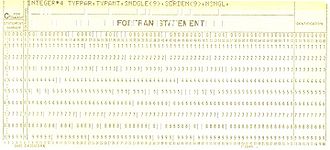Fortran Monitor System
- Fortran Monitor System
-
Fortran Monitor System (FMS) est un système d'exploitation reposant sur le traitement par lots.
Pour l'utiliser, il fallait écrire sur papier un programme (ou job) en FORTRAN ou en assembleur, puis le coder sur des cartes perforées. Un opérateur se chargeait de le donner à la machine, et le résultat sortait sur une imprimante.
Un job consistait en la séquence suivante :
- une carte
$JOB indiquant :
- le temps maximum, en minutes, à accorder au job ;
- le compte à débiter ;
- le nom du programmeur ;
- une carte
$FORTRAN pour charger le compilateur FORTRAN ;
- le programme FORTRAN ;
- une carte
$LOAD pour charger le programme ainsi compilé ;
- une carte
$RUN pour exécuter le programme ;
- les données du programme ;
- une carte
$END pour mettre fin à l'exécution du programme.
FMS tournait sur les ordinateurs IBM 7094 ; mais le modèle de traitement par lots fut remplacé par la génération suivante de systèmes d'exploitation, à commencer par CTSS (qui était toutefois encore compatible avec FMS) et les systèmes d'exploitation qui le suivirent : MULTICS, UNIX...
Wikimedia Foundation.
2010.
Contenu soumis à la licence CC-BY-SA. Source : Article Fortran Monitor System de Wikipédia en français (auteurs)
Regardez d'autres dictionnaires:
Conversational Monitor System — Main articles: VM (operating system), CP/CMS, and History of CP/CMS The Conversational Monitor System (CMS; originally: Cambridge Monitor System ) is a relatively simple interactive computing single user operating system. CMS is part of IBM s VM… … Wikipedia
Conversational Monitor System — (CMS) ist ein Betriebssystem der Firma IBM. Es ist ein Einbenutzersystem und läuft hauptsächlich auf IBM Großrechnern innerhalb eines Hypervisors wie Z/VM. Entwickelt wurde es in einem Labor von IBM, dem Cambridge Scientific Center, daher stand… … Deutsch Wikipedia
Compatible Time-Sharing System — Para otros usos de este término, véase Compatible Time Sharing System (desambiguación). Este artículo se refierel al proyecto del MIT MAC operating system. CTSS También puede referirse a Cray Time Sharing System, un sistema diferente desarrollado … Wikipedia Español
Compatible Time-Sharing System — This article is about the MIT Computation Center operating system. CTSS may also stand for the Cray Time Sharing System, a separate system developed for Cray supercomputers. Compatible Time Sharing System Company / developer MIT s… … Wikipedia
Compatible Time Sharing System — Cet article concerne le système d exploitation du Projet MAC au MIT. Pour un système distinct développé pour les superordinateurs Cray, voir Cray Time Sharing System. Pour celui développé pour les ordinateurs centraux IBM, voir Cambridge Time… … Wikipédia en Français
Compatible Time-Sharing System — Das Compatible Time Sharing System (CTSS) war eines der ersten Mehrbenutzersysteme. Es wurde Anfang der 60er Jahre am MIT entwickelt und bis 1973 genutzt. CTSS wurde auf einem modifizierten IBM 7094 Großrechner entwickelt und betrieben. Das… … Deutsch Wikipedia
IBM System/36 — The IBM System/36 was a minicomputer marketed by IBM from 1983 to 2000. It was a multi user, multi tasking successor to the System/34. Like the System/34 and the older System/32, the System/36 was primarily programmed in the RPG II language. One… … Wikipedia
IBM System/34 — The IBM System/34 was a minicomputer marketed by IBM from 1978 to 1983. It was a multi user, multi tasking successor to the single user System/32. Most notably, it included two very different processors, one based on System/32 and the second… … Wikipedia
Michigan Terminal System — (MTS) The MTS welcome screen as seen through a 3270 terminal emulator. Company / developer University of Michigan and 7 other universities in the US, Canada, and the UK … Wikipedia
IBM System/7 — The IBM System/7 was a computer system, designed in Boca Raton, and delivered in the 1971. [cite web last = IBM title = System/7 Chronology url=http://www 03.ibm.com/ibm/history/exhibits/system7/system7 chronology.html accessdate = 2007 11 22 ]… … Wikipedia

